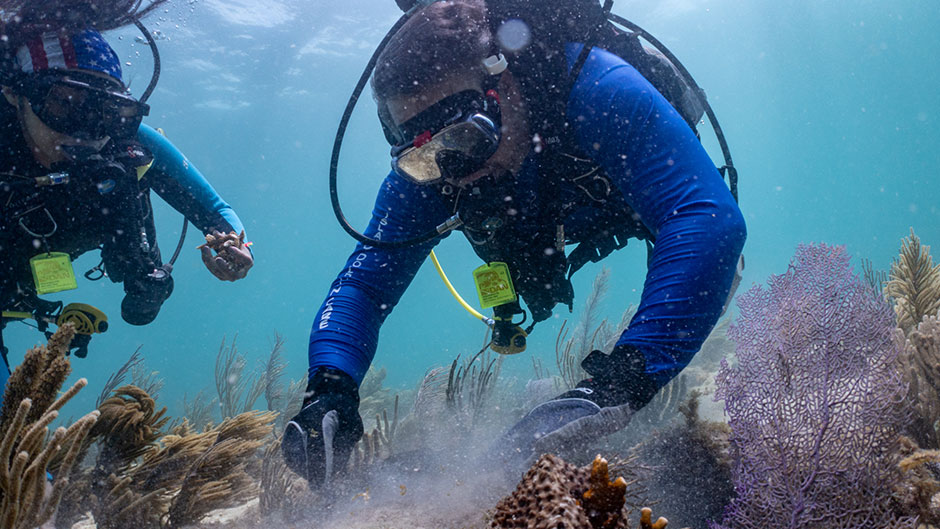Like its counterparts around the world, the Florida Reef, which stretches 350 miles from the Florida Keys to Port St. Lucie, is being decimated by disease, pollution, bleaching, and acidification driven by climate change. This is not an isolated environmental tragedy. Billions of dollars in food, jobs, recreational opportunities, and coastal protection are at risk from the forces imperiling the world’s coral reefs.
Coral reef experts at the University of Miami Rosenstiel School of Marine and Atmospheric Science are leading the fightback in South Florida. And in at least one element of the effort, citizen scientists play a vital role.
Rescue a Reef brings University of Miami students, military veterans, and members of the public on dive and snorkel expeditions during which they replant corals grown in underwater nurseries onto the reef, under the guidance of Rosenstiel School scientists. Since the program’s inception in 2015, hundreds of citizen scientists have replanted corals covering an area equivalent to more than 16 football fields in the waters off South Florida.
Diego Lirman, associate professor of marine biology and ecology and director of the Benthic Ecology and Coral Restoration Lab at the Rosenstiel School, said that he and his colleagues have “seen an increased interest in the work that we do, protecting and trying to restore these important resources. Coral reefs are essential to the economy of South Florida, and they provide the first line of defense against storms—they can mitigate more than 90% of the energy of incoming waves.”
Lirman went on to explain how Rosenstiel scientists and citizen scientists, working together, have been able to restore large tracts of the reef off South Florida. “We are expanding our restoration footprint through what’s called coral gardening, which is exactly what it sounds like,” he said. “Corals are unique animals in that, much like plants, you can break off a coral and you end up with two coral colonies that can grow independently. We are able to expand our sustainable stocks through this fragmentation so that now we have thousands of corals in our nurseries, without having to go out and collect from the very depleted adult wild populations.”
Rescue a Reef works primarily with staghorn coral, one of the most recognizable—and endangered—coral species. In the Rosenstiel School’s offshore coral nursery, staghorn corals are propagated on underwater coral trees. Expedition volunteers dive to the nursery, clean the corals, and break off pieces, mimicking staghorn’s natural reproductive process.
Back on the boat, they sort the finger-size staghorn fragments and get a tutorial on coral replanting from Lirman and his colleagues before venturing once more to the sea floor to plant the corals, where over time they grow and form new colonies. “We are able to plant thousands of corals onto our reefs per year using citizen scientists. Anybody who can snorkel or dive with us is able to help with our restoration,” Lirman said.
Rescue a Reef is the centerpiece of an ongoing effort to educate the public on the importance of coral reefs. “Education is key. In addition to our citizen science expeditions, we are spending an increasing amount of our time and effort educating the public through outreach presentations and workshops” Lirman said.
Although the Rosenstiel School has paused public expeditions and events until covid protocols deem it safe to resume, the work continues on campus. University of Miami students and U.S. military veterans have stepped up to help clear the underwater nurseries of algae and overgrowth, keep the nursery corals healthy, and plant new corals onto the reef tracts.
In 2020 the University’s Citizens Board, comprising more than 270 South Florida business and civic leaders who actively support the U’s philanthropic and programmatic priorities, recognized Rescue a Reef with the $25,000 Citizens Board Sebastian Hero Award, as part of its annual Changemaker Students Fund grant program.
Donor support such as this helps the Rosenstiel School advance its vital work in ensuring a brighter future for coral reefs. Click here to make a gift.
If you are an experienced diver or snorkeler interested in joining a future expedition, click here to learn more and sign up for alerts.

